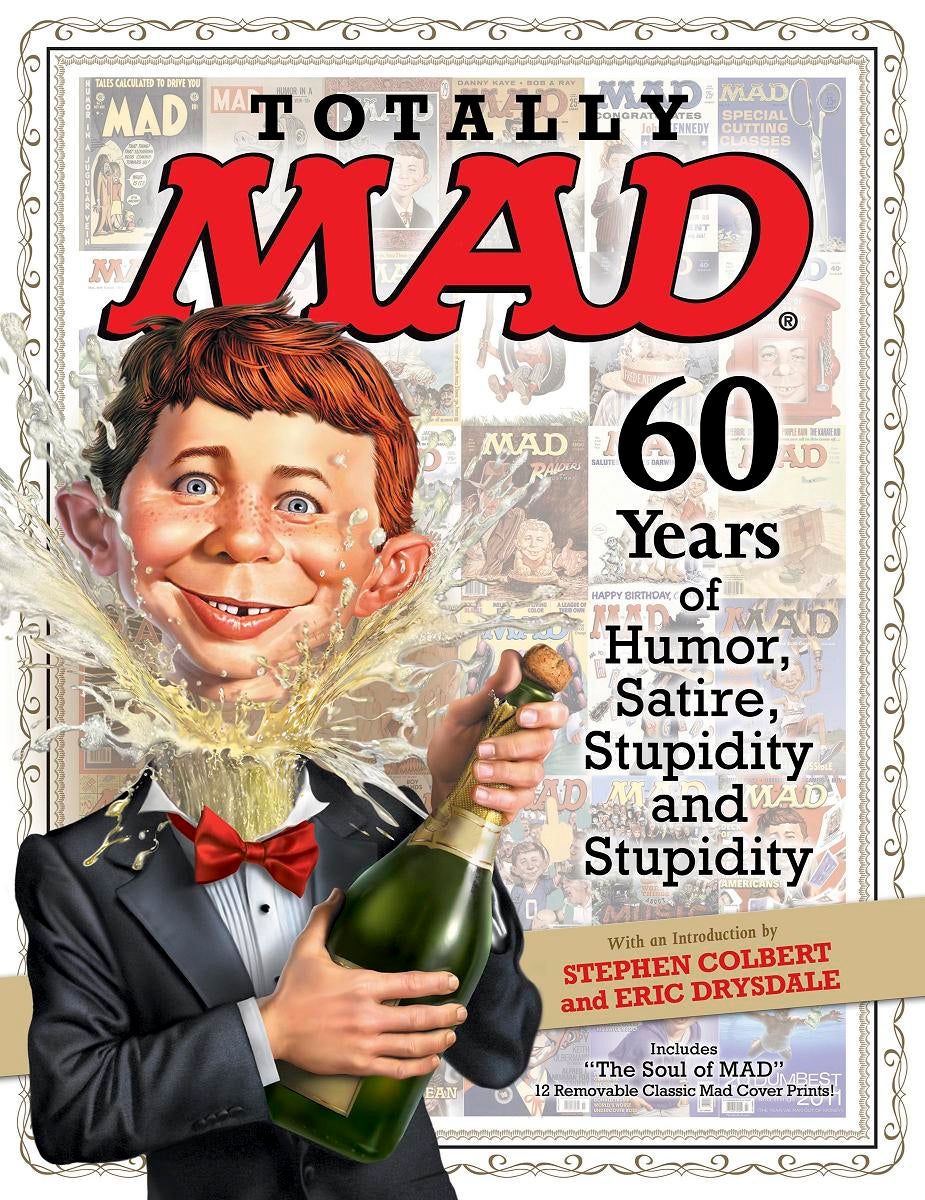'Totally MAD' celebrates 60 years of satire

Your support helps us to tell the story
From reproductive rights to climate change to Big Tech, The Independent is on the ground when the story is developing. Whether it's investigating the financials of Elon Musk's pro-Trump PAC or producing our latest documentary, 'The A Word', which shines a light on the American women fighting for reproductive rights, we know how important it is to parse out the facts from the messaging.
At such a critical moment in US history, we need reporters on the ground. Your donation allows us to keep sending journalists to speak to both sides of the story.
The Independent is trusted by Americans across the entire political spectrum. And unlike many other quality news outlets, we choose not to lock Americans out of our reporting and analysis with paywalls. We believe quality journalism should be available to everyone, paid for by those who can afford it.
Your support makes all the difference.Alfred E. Neuman still looks like the gap-toothed grinning idiot who's too amused by life's pranks to be anxious — the same freckled and reckless boy mascot who perpetually puts the "sophomore" in sophomoric.
But as MAD magazine turns a hard-to-fathom 60 years old, you peer a little closer to see whether gravity, if not gravitas, is tugging at that cartoon smirk. You look for even a trace of irony deficiency, expecting his ageless catchphrase one day to read:
"What?? Me Worry!!!"
As MAD celebrates its 60th anniversary, the publication's main worry — albeit one treated with trademark nonchalance on the surface — is how to stay at the forefront of the very marketplace it helped pioneer more than half a century ago. For at least two generations, MAD was the satiric wolf in "kids' magazine" clothing that subversively encouraged readers to question authority (from Ike to LBJ to Nixon), think for themselves and challenge a world that could take itself too seriously. True to this spirit, MAD even took cases to the Supreme Court to defend and define its freedom of satirical expression.
On the way to establishing its own sly freedom forum, MAD also became a towering pillar of American comedy, reaching a peak circulation of 2 million in 1972 and helping to set the stage for the 1975 debut of "Saturday Night Live" and fire the cultural synapses of the minds behind such eventual quasi-competitors as "The Simpsons," the Onion and "The Daily Show With Jon Stewart."
But now that circulation averages about 200,000 — the same level as not-quite-household-name magazines such as Leadership Excellence and Where to Retire — how do you avoid the perception that you've become a sexagenarian whose relevance has passed?
One way is to bring older readers back into the fold — if not the fold-in — by showing them that Alfred E. Neuman is as stupidly brilliant as ever, and that the magazine is still in genius hands. And while you're at it, perhaps you can lay a little history on younger fans who know MAD only through its quick-paced, mash-up-happy Cartoon Network show that launched in 2010.
And so there is "Totally MAD: 60 Years of Humor, Satire, Stupidity and Stupidity," which — after a foreword co-written by Stephen Colbert — unfurls a collection of first-rate contributions that cover many of MAD's most beloved features: Spy vs. Spy. "The Lighter Side of . . . ," "Snappy Answers to Stupid Questions." Parodic posters of Nixon and Clinton. And movie spoofs such as "Saturday Night Feeble," "The Oddfather" and "Bored of the Rings."
" 'Totally MAD' is for older readers," says veteran MAD editor John Ficarra. "This is clearly a nostalgia trip and hopefully, they'll be transported back to their bedrooms or their cousin's basement. . . . I want to bring older readers back to the magazine, and I want to bring MAD to a new generation of readers."
Besides attracting a new generation of readers, another challenge facing Ficarra — who discovered the magazine in fourth grade, was hired as an editor in 1980 and jokes that he "never had to grow up" professionally — is that the world, and particularly the subjects of Mad's comical jabs, has lightened up. A lot.
"Politicians like to show that they're in on the joke now," says Ficarra. "They like to show that 'I'm not such a bad guy.' "
Ficarra points to a particular sociopolitical signpost when politics began to rain on his charade, satirically speaking.
"We did a poster before the second Gulf War," the editor recalls of the parody that tweaked a "Star Wars" title. "It was 'Clone of the Attack.' We thought it was great, it went around the Web. Then we got a call from a CBS correspondent who had shown it to Condi Rice and Ari Fleischer. They laughed."
Besides serving as a tidy excuse for a career-spanning book, the 60-year anniversary also offers an opportunity to zoom out and try to pinpoint what exactly has made MAD such an iconic comedy brand.
"One day I was sitting with [publisher Bill] Gaines and asked: 'What's MAD's philosophy? People are going to ask,' " longtime contributor Dick DeBartolo says by phone from New York. "He said, 'OK, here's MAD's philosophy: We must never stop reminding the reader how little value we're giving them for their money.' "
The late publisher was kidding, and yet he wasn't: MAD has succeeded by practicing its magnificent craft while never taking itself too seriously. And this "What, me worry?" approach helps one of America's greatest institutions of humor take clear-eyed aim at the ever-changing range of satiric targets.
"We've got pretty good artillery to blast politics and bad movies and Honey Boo Boos," Ficarra says. "And there's always a bad movie and a stupid politician. I like to say: 'We do timeless humor — as long as your clock is broken.' "
Join our commenting forum
Join thought-provoking conversations, follow other Independent readers and see their replies
Comments